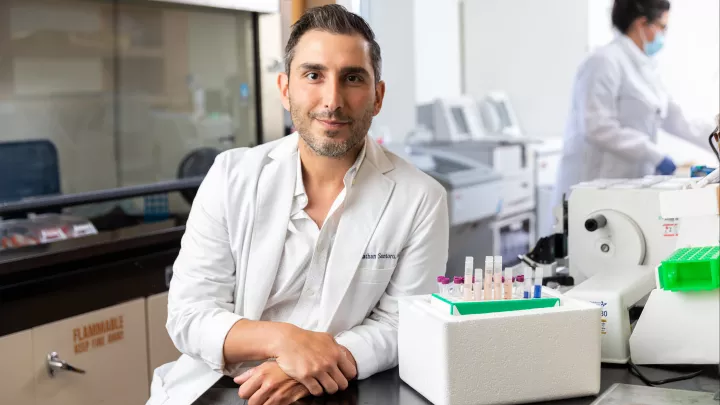Neuromuscular Disorder Diagnosis
Neuromuscular disorders affect strength, the ability to move, sustained power and sensation. At Children’s Hospital Los Angeles, we offer tests to accurately diagnose neuromuscular disorders and monitor treatment response and symptom progression.
Neuromuscular Diagnosis Services
An effective treatment plan starts with an accurate, detailed diagnosis. Our specialists offer a variety of tools to diagnose neuromuscular disorders, including:
- Thorough history and neurological examination
- Genetic testing
- Nerve conduction studies (NCS), repetitive nerve stimulation (RNS) and needle electromyogram (needle EMG)
- Muscle MRI
- Muscle and nerve biopsy
- Skin biopsy
After a diagnosis is made, physicians assess disease progression with diagnostic tests, including:
- Motor and developmental assessments
- Echocardiograms
- Electrocardiograms (EKGs)
- AP and lateral spine X-rays
- DEXA scans
- Scoliosis XR series
- Cardiac MRIs
- Zio patch
- Lab tests
- Pulmonary function tests
- Sleep studies
Electromyography (EMG) Testing
In order for us to move, our brain sends signals to the rest of the body via the spinal cord, nerves and muscles. To feel, signals are sent from the body to nerves, the spinal cord and then to the brain to interpret. The EMG test assesses these pathways. This evaluation can help doctors understand why your child experiences muscle weakness or sensation problems.
EMG testing typically includes two tests performed during the same appointment:
- Nerve conduction study (also called a nerve conduction velocity test, or NCV)
- EMG needle test
- Possible repetitive nerve stimulation
What to expect during a nerve conduction study
A nerve conduction study measures how well electrical signals travel to a nerve. This test can help evaluate nerve damage or injuries.
During nerve conduction testing:
- A doctor places electrodes over specific muscles or sensory nerve distribulations. These electrodes record muscle activity or sensory nerve response.
- An electric stimulation is delivered. These stimulations feel like mild shocks, similar to the static shock of touching a doorknob after walking across carpet.
- The electrodes record your child’s nerve response to the small shocks.
What to expect during an EMG needle test
An EMG needle test, also called a needle electromyogram, tests how muscles communicate with nerves. Performing nerve conduction testing and an electromyogram in the same appointment can help doctors distinguish between muscle, nerve, neuromuscular junction and spine disorders.
During an EMG needle test:
- A doctor inserts a thin electrode/needle electrode into specific muscles. Your child feels a pinprick, and may experience some pain during the testing.
- With the needles in place, the physician asks your child to contract specific muscles, such as making a “peace sign” with the fingers.
- The needle electrode amplifies electrical activity from the muscles. The physician will then interpret what is heard and seen in real time.
Motor scales
Motor scales are standardized testing to objectively assess the motor abilities of our patients. Select, appropriate scales are performed by our experienced physical and occupational therapists during the annual multidisciplinary clinic visit. Using the same scales by the same set of therapists allows our team to measure progression or improvement.
Some of the motor scales we use at CHLA include:
- Assessment of a 6-meter walk, 10-meter walk/run, 4-stair climb and sit-to-stand movement
- Grip and pinch strength
- Revised upper limb module (RUL)
- Performance of upper limb module (PUL)
- Motor Function Assessment
- Brooke Upper Extremity Scale
- Children’s Hospital of Philadelphia Infant Test of Neuromuscular Disorders (CHOP-INTEND)
- North Star Ambulatory Assessment (NSAA)
- Revised Hammersmith Scale for Spinal Muscular Atrophy
- Myasthenia quality of life scales (such as the MG-QOL and MG-ADL scales)
Comprehensive Neuromuscular Care at Children’s Hospital Los Angeles
Experts at Children’s Hospital hold themselves to the highest standards. You can count on us for a precise diagnosis, even for rare neuromuscular conditions.
Diagnostic testing is part of a comprehensive evaluation that also includes assessments from specialists such as neurologists, cardiologists and orthopaedists when necessary. Many patients receive multiple assessments and tests in one visit. Find out more about our Neuromuscular Disorders Center.
After the appointments and testing is complete, we develop a personalized care plan. Our neuromuscular specialists offer a range of advanced treatment options. Find out more about neuromuscular disorder treatments.


